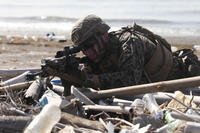The job of every person who loves the returning service member is to educate himself about the war experience and how it could potentially impact his service member. In many ways, it will fall upon those closest to the service member to identify the red flags indicating that he needs help. If you wait to educate yourself until your service member returns home, when you're in the midst of the real work of reintegration, you may find that you won't have the time.
While your service member is still gone, take the time to research the war experience. Thankfully, the Internet provides a great deal of information about:
- The occupational exposure of war
- Known risk factors for posttraumatic stress disorder (PTSD) in returning service members
- Endemic diseases that are known to come out of Iraq and Afghanistan
- Chemical exposure (if your service member should develop respiratory problems he or she never had before)
- Traumatic brain injury
- Substance and alcohol abuse
- Military sexual trauma
- Combat stress, depression, and anxiety
Don't be alarmed by the list. This doesn't mean that your service member is going to come back with a disease or injury. A small percentage of service members suffer from the issues listed, and there may be a small chance that your service member could suffer from one of those things. However, if your service member is suffering from something when she returns, the fact that you have educated yourself about these issues beforehand will enable you to identify the symptoms and have a conversation with your service member in order to get her the help she needs as soon as possible.
With nearly every health problem listed above, early detection and treatment can lead to positive outcomes.
Helpful reading:
- "Returning from the War Zone: A Guide for Families of Military Members"
www.ptsd.va.gov
A guide to help manage the issues of reintegration, created by the National Center for PTSD. - Post-Deployment Health Assessment
www.dtic.mil
This is the health questionnaire that your service member must complete before he is released to return home. It's well known that regardless of how the service member is really feeling, he will say anything in order to be released immediately to his family and friends. And no wonder; if he were to be completely honest, he knows that he could be kept for further evaluation (after already being away from his loved ones for twelve to eighteen months). - Deployment Health Clinical Center
www.pdhealth.mi
This site was designed to assist clinicians in the delivery of post-deployment health care by fostering a trusting partnership among military men and women, veterans, their families, and their health care providers. A great deal of helpful information can be found on the site. - Afterdeployment.org
www.afterdeployment.org
This site provides private self-assessment and skill development modules for many common adjustment topics associated with operational stressors (e.g., sleep, grief, spirituality) including the blog on psychological health topics, a resource for military families.
This excerpt is provided courtesy of the acclaimed free digital resource "Everyone Serves." Download your free copy with additional media content today at everyoneservesbook.com.















